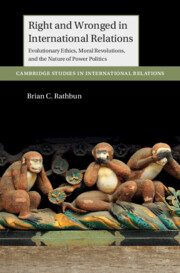 Right and Wronged in International Relations
Right and Wronged in International Relations Binding Morality, Rationality, and the Domestic Politics of War Termination in Germany during World War I
Published online by Cambridge University Press: 29 July 2023
According to bargaining models of war, war reveals private information about resolve and power, to which decision-makers respond rationally by increasing or lowering their reservation price for settling. Germany during World War I presents a puzzle for this baseline rationalist expectation, and theoretical accounts offer three reasons by which leaders in a losing situation might nevertheless rationally continue to fight. If others cannot be expected to abide by any peace settlement, a commitment problem arises that makes fighting on rational. Even exploring diplomatic settlement could reveal private information about a lack of resolve. Self-interested leaders fearing that defeat will result in domestic turmoil, revolution, and the loss of their elite prerogatives might have incentives to “gamble for resurrection.” I argue instead that are all more parsimoniously accounted for through a focus on morality, the expression of the ethics of German nationalists. The nationalist understanding of adversaries as lacking ethical restraint generates the perception of a commitment problem that makes anything else than victory unacceptable. Even peace overtures are dangerous. The German right scorned demands for further democratization during the war as selfish class politics, a betrayal indicating that the country was not unified enough for this existential struggle.
To save this book to your Kindle, first ensure no-reply@cambridge.org is added to your Approved Personal Document E-mail List under your Personal Document Settings on the Manage Your Content and Devices page of your Amazon account. Then enter the ‘name’ part of your Kindle email address below. Find out more about saving to your Kindle.
Note you can select to save to either the @free.kindle.com or @kindle.com variations. ‘@free.kindle.com’ emails are free but can only be saved to your device when it is connected to wi-fi. ‘@kindle.com’ emails can be delivered even when you are not connected to wi-fi, but note that service fees apply.
Find out more about the Kindle Personal Document Service.
To save content items to your account, please confirm that you agree to abide by our usage policies. If this is the first time you use this feature, you will be asked to authorise Cambridge Core to connect with your account. Find out more about saving content to Dropbox.
To save content items to your account, please confirm that you agree to abide by our usage policies. If this is the first time you use this feature, you will be asked to authorise Cambridge Core to connect with your account. Find out more about saving content to Google Drive.